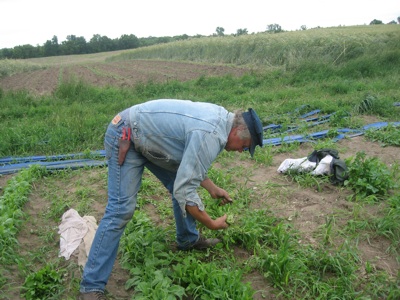 "Take these," Greg Reynolds says, handing me a handful of rubber bands and a clipper.
"Take these," Greg Reynolds says, handing me a handful of rubber bands and a clipper.
"Ah, uh, mmm…," I stammer.
"They’re for the arugula," he offers. Pull 'em out and clip 'em just below the crown. Then rubber band 'em two times around." Maybe Greg doesn’t realize who he’s talking to, or maybe, more likely, he's having fun at my expense.
I'd guess I've spent a total of 20 days on farms in my life, only one of them doing anything closely resembling work. This is number two. I came to Riverbend Farm - located about 30 miles west of Minneapolis - to help the crew harvest this week's farmshare, to take pictures and see how it works. And now I'm harvesting my first bunch of arugula, trimming the ends, and rubberbanding it, twice around. I take a picture. The work crew laughs.
Greg Reynolds is a quiet man, but when he speaks, I listen closely. Since he left his desk job in 1992, Greg and his wife Mary have owned and operated Riverbend Farm, tending their 30-plus organic acres and producing food for many of the Twin Cities best restaurants, including Corner Table, the Birchwood Café, Lucia’s, The Craftsman, Common Roots, and many others. For the past couple of years, Riverbend’s farmshare has provided 18 weekly produce boxes to 80 Twin Cities families, from May to October.
A farmshare, often referred to as Community Supported Agriculture (CSA), is a great way to:
• Eat better, healthier, local food.
• Try new foods you’ve never seen or heard of.
• Learn more about the origin of your food.
• Support local farms and farmers
• Do your part for the environment.
I joined a farmshare for the first time this year, choosing Harmony Valley Farm in Viroqua, Wisconsin for its long season (22 weeks), variety of options (they offer a fruit share, cheese share, coffee share), and mostly because that’s what my neighbor’s recommended. Here’s how it works:
- The farm makes a certain number of produce "shares" available throughout its growing season, typically May through October in Minnesota.
- People can purchase these shares (often priced between $400 and $800 for the entire season, depending on a variety of factors). Some farms offer half shares and other variations on the theme.
- Farms package their harvest in boxes, driving it to various pickup spots in the cities, where people can pick up their weekly bounty. In many cases, people who consume the boxes also get a newsletter telling them what’s new at the farm and hints on what to do with unusual vegetables they’ve received, like kohlrabi and ramps.



